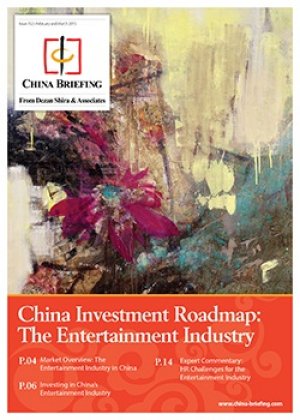Curtain Call: Prospects for Foreign Investment in China’s Culture and Entertainment Industry
By Tongyu Zhang
The Chinese government recently published a series of official measures to boost the development of the country’s culture and entertainment industry, including the Opinions on Promoting the Upgrade of Cultural and Entertainment Industry and the Film Industry Promotion Law (effective on March 1, 2017). China has seen rapid growth in the culture and entertainment industry in recent years, owing to government support as well as a growing middle class consumer base. According to a recent report on the Entertainment & Media (E&M) industry by PwC, China’s E&M market has increased by 50 percent since 2010 and is forecast to rise at a compounded annual growth rate (CAGR) of 8.8 percent over the next five years. The internet advertising, film, and video game segments will be the main intra-industry dynamics that will drive growth, with a projected CAGR from 2015 to 2020 of 13.9 percent, 18.9 percent, and 7.4 percent, respectively. However, as the Chinese government aims to use the cultural sector as a ‘soft power’ tool, such political intentions will inevitably lead to a certain extent of sensitivity for foreign participation in China’s culture and entertainment industry.
Film industry
The latest data revealed by The State Administration of Press, Publication, Radio, Film and Television of the People’s Republic of China (SAPPRFT) shows that China’s box office revenue reached RMB 45.7 billion in 2016, with 3.73 percent year-on-year growth, which is disappointing compared with the 48.7 percent growth in 2015. However, with a broader perspective, China’s total film audience reached 1.3 billion in 2016, which is expected to exceed that of the North American market for the first time. By the end of 2016, China had the world’s largest amount of projection screens (41,179), in more than 7,800 theaters. These statistics imply that China still holds an immensely lucrative film market despite the past year’s slowed growth.
According to the latest opinion-seeking draft of the 2016 Catalogue of Industries for Guiding Foreign Investment, foreign investors are still prohibited from investing in film production, distribution, and theater line companies. Currently, the annual quotas for importing foreign films remained 34 for revenue-sharing quota and around 30-40 for the flat-fee quota, while the next round of China-US film negotiations is expected to start in 2017. However, there is a sense that further restrictions on import of foreign films might come about. For instance, since April 1, 2016, the SAPPRFT requires foreign films and TV series to register for a ‘publication license’ in order to show content and stream online, along with a 30 percent limit for importing online video of foreign films TV shows.
Despite the tightening policy trend in the film industry, foreign investors still have access to the prosperous sector. In terms of film production, co-production with Chinese filmmakers has been a growing trend in the past several years. A co-production movie is required to be at least 51 percent Chinese‐owned, and will be considered as a domestic film and not subject to the quota, calling for a project-based method for foreign investors’ market entry into China’s film production sector.
The construction and operation of movie theaters is accessible for foreign investors within certain limits. While at present, wholly-foreign owned cinemas remain prohibited (except for investment from Hong Kong and Macau), joint ventures with a Chinese party as controlling shareholder are permitted. Furthermore, in a handful of pilot cities (Beijing, Chengdu, Guangzhou, Nanjing, Shanghai, Wuhan, Xi’an), the proportion of registered capital invested by foreign partners is capped at 75 percent. In consideration of the highly-competitive market and regulations, foreign investors may focus their business scope on operation of movie theaters and cinema-related equipment and technology.
Video game industry
China is the world’s third largest video game market after the US and Japan. According to the Chinese Game Publishing Commitment (GPC), in 2016, the consumer revenue of China’s game industry increased by 17.7 percent to RMB 165.6 billion, and the total amount of gamers reached 566 million, 5.9 percent up on 2015. The SAPPRFT approved the publication of more than 4,000 games in 2016, surging from about 750 games in 2015, around 3,800 of which were developed by domestic companies. Mobile games take up nearly 90 percent of the total amount, compared with 49.7 percent in 2015, while other types of video game, including PC games, browser games, and console games, account for the rest. The complexity of China’s fast-growing video game sector is caused by multiple factors, including government policies, a multi-dimensional market structure, unbalanced investment, a relatively simple business model, and so on. This brings both opportunities and challenges for foreign investors to participate in the sector. Therefore, it is important to know more about China’s local market and adapt proper strategies.
![]() RELATED: Pre-Investment and Entry Strategy Advisory from Dezan Shira & Associates
RELATED: Pre-Investment and Entry Strategy Advisory from Dezan Shira & Associates
In 2016, China’s e-sport games grew rapidly, with its consumer revenue accounting for 30.5 percent of the total amount, as reported by GPC. The popularity of e-sport competitions has led to further development of video game streaming platforms, which have attracted a total audience of over 100 million. In addition, the Ministry of Culture’s opinions on the promotion of the entertainment industry also suggest using e-sports to promote the video game industry, and provide policy incentives for e-sports sector development. However, the business model for Chinese e-sport competition has not been properly established, resulting in weak profit-making capabilities. Foreign investors may apply their successful experience in the market development and operation of e-sport events, which could also promote further market entry opportunities for foreign companies into China’s wider video game industry.
A noticeable technological trend in the video game industry is the implementation of Virtual Reality (VR) and Augmented Reality (AR) technology, with the launch of Sony’s PlayStation VR and the hit of Nintendo’s “Pokémon Go”, for example. As the commercialization of such technology gradually matures, as well as the positive attitude of related Chinese authorities, both foreign game-making companies and VR/AR related high-tech companies should seize the opportunity to partake in China’s video game market.
Censorship
Content is a big issue in the culture and entertainment industry. China has no rating system for either movies or video games in place, and therefore have to be reviewed by the Chinese censorship system, which is officially designed to promote Confucian morality, political stability, and social harmony. Based on related laws and regulations, films and games share similar prohibited content, as follows:
- Opposing the fundamental principles laid down in the constitution of the PRC;
- Jeopardizing the unification, sovereignty, and territorial integrity of the state;
- Divulging state secrets, jeopardizing the security of the state, or impairing the prestige and interests of the state;
- Inciting hatred and discrimination among ethnic groups, harming their unity, or violating their customs and habits;
- Propagating cults and superstition;
- Disrupting public order and undermining social stability;
- Propagating obscenity, gambling or violence, or abetting to commit crimes;
- Insulting or slandering others, or infringing upon the legitimate rights and interests of others;
- Jeopardizing social ethics or fine national cultural traditions.
Apart from the two dynamic sectors discussed above, China’s culture and entertainment industry has a broad range of areas with growing potential, including music, live performances, theme parks, and more. Due to the sensitivity of China’s cultural sector and the complex market environment, however, it is critical for foreign investors to carry out detailed planning as well as carefully navigate industry regulations in each subsector.
|
Asia Briefing Ltd. is a subsidiary of Dezan Shira & Associates. Dezan Shira is a specialist foreign direct investment practice, providing corporate establishment, business advisory, tax advisory and compliance, accounting, payroll, due diligence and financial review services to multinationals investing in China, Hong Kong, India, Vietnam, Singapore and the rest of ASEAN. For further information, please email china@dezshira.com or visit www.dezshira.com. Stay up to date with the latest business and investment trends in Asia by subscribing to our complimentary update service featuring news, commentary and regulatory insight.
|

China Investment Roadmap: The Entertainment Industry
In this special edition China Briefing Industry Report, we cast our gaze over the broad landscape of China’s entertainment industry, identifying where the greatest opportunities are to be found and why. Next, we detail some of the most important issues for foreign investors to be aware of, including legal, regulatory, and tax considerations specific to the industry. Lastly, we provide an insider analysis of the sector’s unique HR & payroll challenges.
 Establishing & Operating a Business in China 2016
Establishing & Operating a Business in China 2016
Establishing & Operating a Business in China 2016, produced in collaboration with the experts at Dezan Shira & Associates, explores the establishment procedures and related considerations of the Representative Office (RO), and two types of Limited Liability Companies: the Wholly Foreign-owned Enterprise (WFOE) and the Sino-foreign Joint Venture (JV). The guide also includes issues specific to Hong Kong and Singapore holding companies, and details how foreign investors can close a foreign-invested enterprise smoothly in China.
 An Introduction to Doing Business in China 2016
An Introduction to Doing Business in China 2016
Doing Business in China 2016 is designed to introduce the fundamentals of investing in China. Compiled by the professionals at Dezan Shira & Associates in June 2016, this comprehensive guide is ideal not only for businesses looking to enter the Chinese market, but also for companies who already have a presence here and want to keep up-to-date with the most recent and relevant policy changes
- Previous Article China in 2017 – Increasing Trade Alliances With Eurasia
- Next Article Case Study: Capital Increases and IIT Calculation During Equity Transfers in China










